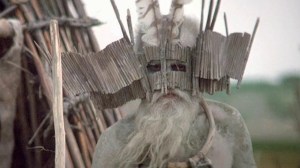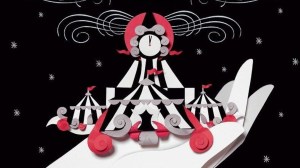Dating back to the ’50s with Alfred Hitchcock Presents, horror anthologies have always been popular with TV audiences, with the ’80s seeing a massive surge in tales of terror. When the ’90s arrived, even Nickelodeon got in on the action, debuting Are You Afraid of the Dark?, kicking off the network’s debut of SNICK, a block of programming geared at older audiences.
Videos by ComicBook.com
The series honored the traditions of The Twilight Zone by having introductions to each episode to give context to what viewers were about to see, utilizing a group of teens calling themselves the “Midnight Society” gathering around a campfire each week to tell stories in hopes of frightening one another. With the show being geared towards younger audiences, there was often a lesson to be learned from each episode, though that doesn’t mean every story ended on a happy note.
Parents tuning in to the series might not have been frightened by each episode, as they were often inspired by famous short stories, though for an entire generation of burgeoning horror fans, the stories of ghosts, monsters, and urban legends helped inspire them to seek out terrifying tales, while other viewers steered clear of the genre indefinitely.
To celebrate the series’ 26th anniversary, scroll down to see our picks for some of the most effective episodes of Are You Afraid of the Dark?!
‘The Tale of the Dream Girl’
While it might not be the most horrifying story featured on the series, it offers one of its best narratives.
Johnny works maintenance at a bowling alley when he discovers a woman’s ring in his locker. Perplexed, he tries it on, but it never comes off. He asks his sister about the ring, though she has no answers for him. Johnny begins having visions of a beautiful girl, all while his mom and co-workers give him the cold shoulder. By the end of the episode, we learn that what is haunting about the story is that Johnny was killed by a train and the ring belonged to his girlfriend, who died in the accident as well. This ultimately explains why no one but his sister can see him.
If the story sounds familiar, that’s because it was the entire plot of The Sixth Sense. This isn’t to say M. Night Shyamalan ripped off the idea, but proves the effectiveness of the story structure.
‘The Tale of Laughing in the Dark’

Movies like Poltergeist and the mini-series adaptation of Stephen King’s IT made clowns a go-to source of horror, with Are You Afraid of the Dark? delivering viewers their own terrifying jester.
To make good on a dare, a teen must enter a haunted house ride at a circus to steal the nose off of a clown that is said to represent a former worker who stole money from the circus and hid out in the ride, only for his cigar to have lit a fatal fire. The teen makes good on the dare, only to receive phone calls and find a balloon demanding, “Give it back.”
The effectiveness of this episode is not only the image of the clown itself, but also the implied fear that the specter could be right around the corner, evoking fear by never having to actually show the audience what we were afraid of.
‘The Tale of the Frozen Ghost’
The series always introduced their stories with the line, “Submitted for the approval of the Midnight Society,” with this episode giving audiences another memorable quote with the line, “I’m cold.”
When two spoiled siblings move out to the country, they have a difficult time coping with the inclement weather. As they arrive at their aunts’ house, they are frustrated that the wood stove doesn’t work, preventing the house from ever heating up. After repeatedly seeing a young boy’s ghost who can only proclaim, “I’m cold,” the siblings discover that this boy had passed away after a bank robber stole his sweatshirt, which was then shoved into the wood stove to prevent it from working.
The creepy ghost boy stuck with most viewers, while the implication that a robber was ultimately responsible for the boy’s death unsettled many audiences.
‘The Tale of the Super Specs’

Other than the Midnight Society themselves who introduced each story, another recurring character was the magician Sardo, who often inspired many of the stories to unfold.
While visiting Sardo’s magic shop, a boy tests out some magic dust on a pair of glasses that are said to grant x-ray vision. The spell proves ineffective when it comes to seeing through clothes, but instead the wearer sees people clad head-to-toe in black. It is determined that the specs allow wearers to see people from another dimension, co-existing in the same plane. The different dimensions wage battle for who the reality belongs to, with the alternate dimension reigning supreme.
If the image of the interdimensional beings wasn’t creepy enough, the climax of the “humans” being banished to another realm was a horrifying resolution.
‘The Tale of the Twisted Claw’
The classic “be careful what you wish for” story of the Monkey’s Paw was repurposed for this tale, instead using the claw of a vulture to represent the disastrous aftermath of wishing for changes in your life.
A teen receives the relic while trick-or-treating, first wishing that the night would end, only for bullies to steal his candy, effectively ending the evening. He then wishes to win the 600-yard race at school, only for a dog to attack his competitor, allowing him to win. Under intimidation of the claw, the teen wishes his grandfather was there, despite having passed away. The teen sees his grandfather’s car slowly drive towards his house, with a last-minute use of the claw erasing all of the wishes that had taken place.
Fans familiar with this story may have known everything would turn out okay, though, much like with Zeebo the clown, the final moments of the episode where audiences wonder if the grandfather will really appear effectively terrorized viewers with their own imaginations of what the ghost or reanimated corpse would look like.
‘The Tale of the Phone Police’

While not nearly as horrifying as other tales, the number of viewers who were likely making prank phone calls in the early ’90s made this story especially effective.
In the midst of making elaborate prank calls, two friends are warned of the Phone Police who track down and capture anyone breaking the “rules” of how to use the phone. The friends discover the number for the Phone Police in the phone book, noting that it consists of six digits. The duo head out to investigate the organization, discovering many trapped pranksters, vowing to never make a prank phone call again.
The big hook with this episode is that the final moments show that the Phone Police were still monitoring the prankster, posing as pizza delivery men. More hokey than terrifying, this episode still made many teens question how many things their parents made up merely to scare them into acting appropriately were actually substantial threats or if there was any truth to the many things they warned us about.
‘The Tale of the Shiny Red Bicycle’
Few things mean as much to teenagers as their friendships, which was what made “The Tale of the Shiny Red Bicycle” so effective.
Mike and Ricky ride their bikes past a shallow river, only for Ricky and his shiny red bike to fall into the water and drown. Mike is haunted by this vision, having nightmares in subsequent years and even believing he sees his friend around town. When Mike’s younger brother goes to this same river, Mike believes to have an encounter with Ricky where he tells him how much he misses him and how hard he tried to save him. Ricky gives him a hug and allows him to ride his bike to the river to save Ben, whose leg got trapped between rocks and faced certain doom in a similar manner to Ricky. The next day, Ricky’s remains are finally found.
Friendships can easily be fractured in high school, with the scenario of the story connecting with many of the show’s younger viewers. Whether it be longing for a friend you lost because of an argument or because they had suffered a fatal accident, the opportunity to make amends doesn’t often present itself, with this story depicting an opportunity to say goodbye that many of us wish we could have with anyone we’ve lost.








